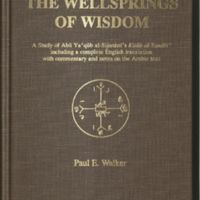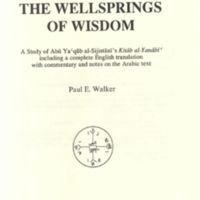The Wellsprings of wisdom: a study of Abū Yaʻqūb al-Sijistānī's Kitāb al-Yanābīʻ : including a complete English translation with commentary and notes on the Arabic text
Dublin Core
Title
The Wellsprings of wisdom: a study of Abū Yaʻqūb al-Sijistānī's Kitāb al-Yanābīʻ : including a complete English translation with commentary and notes on the Arabic text
Description
The rapid success of the early Isma'ili dacwa, or religio-political mission, culminated in the establishment of the Fatimid caliphate in the year 909. Modern scholarship in Ismaʹili studies has revealed that the Ismaʹilis were also engaged from early on in their eventful history in diverse intellectual activities, some of which were unique to the Ismaʹili community. In particular, while the early Fatimid caliph-imams were still preoccupied with consolidating the power base of their dawla in North Africa, some of the Ismaʹili daʹis of the Iranian lands elaborated a distinctive Isma'ili tradition of learning, amalgamating in a highly original fashion their Ismaʹili interpretation of Islam with a type of Neoplatonic philosophy then current in Khurasan and some other eastern regions of the Muslim world. -- from http://www.jstor.org (Nov. 16, 2013).
Creator
Paul E. Walker
Publisher
Salt Lake City : University of Utah Press
Date
1994
Table Of Contents
The Foundations of an Epistemology -- Abu Yaqub al-Sijistani. Ismaili Literature. The Importance of al-Sijistani. His Life and Works. Some Critical Points in His Teachings -- The Book of Wellsprings. Organization and Special Features. Background and Sources. Dating The Wellsprings. Authenticity. Title. Method and Audience. State of the Arabic Text. Translating The Wellsprings. Notes and Commentary. The Diagrams -- The Book of Wellsprings: Translation.
Text Item Type Metadata
Original Format
Book
Citation
Paul E. Walker, “The Wellsprings of wisdom: a study of Abū Yaʻqūb al-Sijistānī's Kitāb al-Yanābīʻ : including a complete English translation with commentary and notes on the Arabic text,” Humanities Hub, accessed February 27, 2026, https://humanitieshub.sdsu.edu/omeka/items/show/1740.


